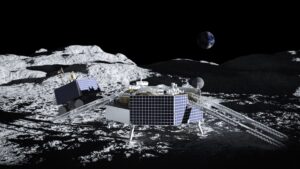Senate Appropriators Approve Slightly More Than House for NASA in FY2025
The Senate Appropriations Committee approved the FY2025 Commerce-Justice-Science bill today that includes funding for NASA. The agency would get $25.43 billion, a roughly $50 million increase above the $25.38 billion request. By contrast, their House counterparts approved $25.18 billion, $200 million less than the request. The Artemis program to return astronauts to the Moon would get $30 million of that increase in the Senate bill.

Sen. Jeanne Shaheen (D-NH) and Sen. Jerry Moran (R-KS), chair and ranking member of the subcommittee, both singled out Artemis in their brief opening statements.
The money is to “return astronauts to the Moon including the first woman and the first person of color and maintain U.S. leadership in space,” Shaheen said. Moran added that Artemis will “maintain our strategic advantage over China.”
Their comments echoed what they said on Monday at the Farnborough International Airshow.

Full committee chair Sen. Patty Murray (D-WA) didn’t mention Artemis by name, but pointed to the bill’s “support for NASA’s missions and maintaining our incredible legacy of leadership in space.” Her state of Washington has a sizable space industry including the headquarters of Blue Origin, which is building one of the two Human Landing Systems for Artemis.
A committee summary provides highlights of the NASA portion of the bill. It says NASA gets $25.4 billion, “a $559 million increase” over FY2024. NASA received $24.875 billion for FY2024, so that would make it more precisely $25.434 billion. The accompanying report that has more detail was not publicly available as of press time.

The only other Senator who spoke about NASA funding was Sen. Shelley Moore Capito (R-WV) who is “very disappointed” at NASA’s decision to cancel the VIPER lunar rover. Calling it “a major advancement” for the Artemis program, she asked Shaheen and Moran “to work with me as the bill moves forward to look for ways to repurpose the lander portion of this mission to advance Moon to Mars objectives.”
NASA has proposed terminating VIPER, a NASA rover, but not the lander, however. VIPER was to be delivered to the Moon on a commercial lander built by Astrobotic, a company in Capito’s neighboring state of Pennsylvania. West Virginia, Pennsylvania and Ohio established the Keystone Space Collaborative to support the space industry in those states. Astrobotic’s lander, Griffin, is funded separately from the rover and is moving forward toward a launch currently targeted for September 2025. It will carry whatever commercial payloads Astrobotic signs up, but not VIPER. NASA will provide a mass simulator in its place.

VIPER is part of NASA’s Science Mission Directorate, which suffered NASA’s biggest cuts in FY2024 due to the budget caps set by the Fiscal Responsibility Act. The caps remain in effect for FY2025.
VIPER is just one science program targeted for cutbacks or termination. The FY2025 request proposes terminating the Geospace Dynamics Constellation heliophysics program, reducing funding for the Chandra X-ray space telescope to a level that would essentially end operations, and pausing the Mars Sample Return mission while NASA seeks more affordable concepts for returning samples of Mars to Earth.
NASA needs congressional concurrence before canceling programs and made clear it won’t terminate the VIPER rover until Congress responds to its proposal. Congress has negated NASA plans to terminate missions in the past. One of them got a shout-out in the committee’s summary today — NEO Surveyor, a space telescope dedicated to finding asteroids that might pose a hazard to Earth. NASA wanted to indefinitely delay NEO Surveyor several years ago, but Congress disagreed and directed NASA to proceed with launch no later than 2028. The Senate bill specifies NASA must spend $236 million in FY2025, basically the same as the request ($235.6 million) and a slight increase over FY2024. The House bill uses $235.6 million as the floor, but allows NASA to spend up to $296.7 million.
Other programs facing cutbacks or termination hold out hope Congress might rescue them, too, but with the budget caps in place, adding money for one program almost inevitably means cutting someone else’s — robbing Peter to pay Paul.
With the House and Senate committees having approved their CJS bills, the initial steps of NASA’s FY2025 appropriations process are done, but there is a long way to go.
The House committee approved $25.18 billion, about one percent less than the request, but one percent more than FY2024. Artemis was a priority in the House, too. Until the Senate report is available it’s not clear how in sync they are on the rest of NASA’s activities, but they will have to reach agreement eventually.
NASA is just one part of the CJS bill and there are many highly controversial topics in other sections, especially the Department of Justice. House Republicans also are adding social policy provisions that are anathema to Democrats. All of that will complicate passage.
Some appropriations bills already are running into trouble in the House. The Legislative Branch bill that funds Congress itself failed to pass. The House was supposed to be in session not just this week, but next week to complete floor consideration of all 12 bills. Instead, House leadership sent everyone home today when it became clear they didn’t have enough Republican votes to pass the bills. They will not return until the second week of September.
The Senate Appropriations Committee has cleared seven of the 12 bills and will meet to approve the other five next week. Then they are off until September.
Final passage of any FY2025 appropriations bills by both chambers is all but impossible before the fiscal year ends on September 30 or the elections on November 5, and unlikely by the end of year if party control of the House, Senate, or White House will change. The government will almost certainly have to operate under Continuing Resolution(s) for several months where they are held to current spending levels and programs cannot be started or terminated.
User Comments
SpacePolicyOnline.com has the right (but not the obligation) to monitor the comments and to remove any materials it deems inappropriate. We do not post comments that include links to other websites since we have no control over that content nor can we verify the security of such links.